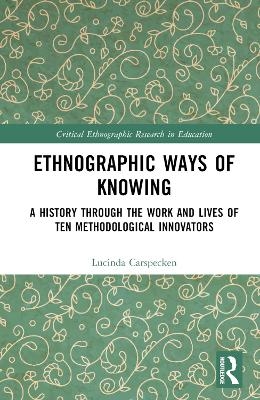
Ethnographic Ways of Knowing
Routledge (Verlag)
978-1-032-35403-3 (ISBN)
Drawing on the works of ten scholars and public intellectuals ranging over 200 years, this book foregrounds ways of knowing that include but go beyond the cognitive.
The book explores the work of Harriet Martineau, Jane Addams, W. E. B. Du Bois, Zora Neale Hurston, Ella Deloria, M. N. Srinivas, Barbara Myerhoff, Orlando Fals Borda, Ronald Takaki and Nawal El Saadawi. The author discusses their multifaceted ethnographic practices and argues that such practices are still under-acknowledged in contemporary research in comparison to cognition and categorization. These scholars were outsiders to their societies in a variety of ways. They highlighted power imbalances in the perception and representation of one group by another and brought direct experience, emotion, narrative, imagination, recognition, self-reflection, activism and cultural humility into their writing, in addition to rationality. The book engages with the authors and their ideas in the context of their times and places. It also reclaims them as methodological predecessors, noting their contributions to what educational ethnography has been and what it could be in the future.
Expanding the canon of social research history and providing insight into unique methodological forms, this text will be valuable for scholars and postgraduate students with interests in ethnography, as well as the history of research, anthropology and qualitative methods more broadly.
Lucinda Carspecken is a senior lecturer in Qualitative and Quantitative Research Methodology at Indiana University.
Introduction: Ethics and Ancestors in Ethnography Part I: Ethnography as Public Work 1. The Traveler with the Ear Trumpet: Harriet Martineau as Methodological Pioneer 2. Jane Addams and the Coat: Research as Lateral Practice 3. Chart and Compass in W.E.B. Du Bois’s Early Work Part II: Building Imaginative Bridges 4. “I was just crazy to get into the dance,”: Zora Neale Hurston’s Celebratory Research in Florida 5. The Dakota Way of Life and Waterlily: Ella Deloria’s Gifts 6. M.N. Srinivas and the Inconvenient Detail 7. The Work of Recognition in Barbara Myerhoff’s Number Our Days Part III: Fusions: Participatory Action Theory, Ethnographic History and Auto-ethnography 8. Orlando Fals Borda and Participatory Action Research: Looking for the Place Where Waters Meet 9. The Many and the One: Ronald Takaki’s Revisioning of the United States 10. The Singing Man and the Suitor: Auto-ethnographic Ways of Knowing in Nawal El Saadawi’s Memoirs
| Erscheinungsdatum | 13.06.2024 |
|---|---|
| Reihe/Serie | Critical Ethnographic Research in Education |
| Verlagsort | London |
| Sprache | englisch |
| Maße | 152 x 229 mm |
| Gewicht | 453 g |
| Themenwelt | Sozialwissenschaften ► Ethnologie |
| Sozialwissenschaften ► Pädagogik ► Bildungstheorie | |
| Sozialwissenschaften ► Soziologie | |
| ISBN-10 | 1-032-35403-8 / 1032354038 |
| ISBN-13 | 978-1-032-35403-3 / 9781032354033 |
| Zustand | Neuware |
| Haben Sie eine Frage zum Produkt? |
aus dem Bereich


